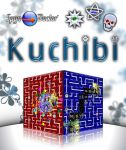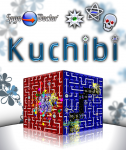Summary
Kuchibi is a puzzle game in which the player tries to build connected chains of stones, to then ignite and explode the stones. The exploding stones award score points, and one of the goals of the game is to maximize the score by building the longest explosion chains possible. Various extras which are earned for special combos also help in achieving this goal.
During the creation of Kuchibi, one special design focus has been to make the game a satisfying experience for both beginning players as well as for experts: The level of entry is very low, as the rules are quite simple, so that a beginner has an immediate sense of achievement (with satisfying explosions!). But as the player learns more about the game, it exposes more and more depth, so that even an experienced player will continue to be challenged by Kuchibi, trying to build ever more complex chains and combinations and rack up highscores which previously seemed unattainable.
Kuchibi Game Trailer
The Basic Rules
The basic rules of Kuchibi are simple: Kuchibi is played on a 9x9 grid of stones. Each stone has a fuse connector. There are two types of fuses: Straight and corner (90 degrees). You select a stone with the L-Stick and then press „A“ to flip the fuse on this stone. A straight fuse is flipped between horizontal and vertical. A corner fuse is flipped so that each end flips to the opposite side of the stone.
The player can freely select any of the stones to flip its fuse, and the goal is to flip the fuses in such a way, that the longest possible chain of connected stones is created (or other figures, like loops and streaks, see below). The difficulty lies in the fact, that each fuse type has a peculiarity which stops the player from simply arranging the fuses as he wants:
A corner fuse can only be flipped on the ends which are not connected to a fuse on a neighboring stone: If both ends are unconnected, then both are flipped (to the opposite side of the stone). If only one end of a corner fuse is unconnected, only this free end is flipped. If both ends are connected, then this corner fuse can not be flipped at all.
A straight fuse can always be flipped, no matter if it is currently connected to a neighboring fuse or not. However, if a straight fuse is flipped in such a way, that after the flip it connects with another straight fuse (on either end), then this will cause the flipped fuse to ignite. (More about this ignition below.)
So one of the problems the player faces is, that more often than not, he would like to flip a corner fuse in a certain way, only because how the fuse is currently connected to other fuses on one or both ends, the desired flip is not possible.
Or the player would like to flip a straight stone, but doing so would cause an ignition, prematurely exploding the chain the player is trying to build.
Because if the flip of a straight stone causes an ignition, then this ends the current turn: The flipped fuse ignites and the ignition spreads to the connected fuses of the two neighboring stones on both ends (if any), and from there it spreads on along the whole fuse chain in both directions. The ignited fuses in turn will cause their stones to explode. Each exploding stone gives score points: The farther away from the ignition stone, the more points the player gets for each stone. This challenges the player to try to maximize the score of each explosion, by thinking ahead: Exploding a given number of stones in one single long chain gives a higher score than exploding the same amount of stones with several shorter chains. And igniting a chain of a given length at one of its ends gives a higher score than igniting a chain of the same length somewhere in the middle.
Special Figures, Combos and Extras
In addition to just trying to explode normal stone chains, the player can also try to build special figures:
A loop is a chain of stones where both ends of the fuse chain meet. A loop is ignited as soon as it is closed (so there is no need to flip a straight stone to ignite it) and each exploded stone in the loop gives double the normal score. Plus you are awarded with a loop-bomb extra for closing the loop.
A loop which also encloses additional unconnected stones is called a Kuchibi loop (or just „Kuchibi“). A Kuchibi gives five times the score for each stone, plus giving you an extra and also explodes all the enclosed stones. A Kuchibi is however by far the most difficult figure to complete.
A streak is a fuse chain that goes over the whole board, either from the left to the right border, or from the top to the bottom border. Just like a loop, a streak is ignited as soon as it is finished, and it also gives double the normal score for each stone. Plus it gives you a horizontal- or vertical-bomb extra (depending on the streak direction).
The figures described above can either be completed by flipping the last stone into place (the „normal“ way), or by letting the last stone drop into place (by exploding other stones beneath it). The latter is called a „combo“ and gives double the normal score.
In addition to the already mentioned bomb extras, there are also multiplier extras (awarded for especially high scores in a single turn) and joker extras (awarded for reaching certain thresholds in the total score).
The Game Modes
Based on these basic rules, Kuchibi offers a variety of four different game modes (each in three different difficulty levels), for different challenges.
Marathon mode and Survival mode are game modes which are less frantic and which focus more on strategic puzzle solving and planning, as there is no time pressure: The player can play at his own pace, with all the time he needs to plan ahead strategically:
Marathon mode is the basic Kuchibi game mode, which allows the player to play along with the basic rules explained above more or less endlessly, to rack up a higher and higher score (although there are ways to both lose and win a marathon game).
Survival mode is a mode that requires a very different strategy than marathon mode, as here the exploded stones are not immediately replaced, so the board becomes more and more empty. The key to success is not to maximize the score, but to maximize the number of stones removed from the board before the player has to yield the level (when all remaining stones from the previous level will be „locked“ in the next level).
Timer mode and Scramble mode are game modes which put the player under time pressure, thus focusing more on quick and nimble play instead of strategic long-term planning:
Timer mode is quite similar to marathon mode, only that the player has but a limited amount of time to play, which is however extended by bonus time earned through scoring. So the key is to score quickly, and high, to keep the time from running out.
Scramble mode starts off with a board that is initially only partially filled. All the time, new stones drop into the board in ever shorter intervals, and soon the player has to scramble to remove stones from the board (by exploding them). Because when the first stone can not drop into the board because there is no space for it, the scramble game is lost.
More Features
Replay value is added to Kuchibi with local highscore lists, online top-score lists and medals:
There are twelve local top-ten highscore lists (one for each of the three difficulties in each of the four game modes) for local competition between players using the same Xbox, and similarly twelve online top-score lists for competition with other Kuchibi players world wide. The top-score lists automatically update and synchronize themselves with the top-score lists of other Kuchibi players. This online synchronization happens automatically in the background while playing Kuchibi, without player intervention. (The online synchronization requires a Xbox Live Gold profile.)
And in addition to trying to rise in the highscore and top-score lists, a player can earn medals for certain special actions and accomplishments: Medals come in the levels bronze, silver and gold. Some medals are awarded for certain turn-based accomplishments (like scoring above a certain value in a single turn, exploding a certain number of stones in a single turn, building a loop of a certain size, etc.). Other medals are awarded for general accomplishments (like playing Kuchibi for a certain amount of time, reaching a certain total score in all games played, building a certain number of streaks in all games played, etc.).
Kuchibi's specialty regarding medals is, that for medals of the turn-based type, you can always watch a replay of the turn during which you were awarded this medal. So it happened that it were late at night and you were alone in front of the Xbox when you managed to crack that certain gold medal by exploding half of the stones on the board, with a super-long chain and four bombs at once, followed by a double loop-combo? And nobody was there to witness your victory cry? Don't despair! Just show the replay to your friends when they come over the next time. Prime bragging time!
Spyn Doctor Games is proud to announce, that the game Kuchibi has been released on Xbox LIVE Indie Games on September 7th, 2009, for the price of 80 MSP (about 1$ / 1€).

















Kuchibi is now in peer review on the XNA Creators Club website. If this goes well (i.e. no problems found) it will be released in a few days.
BTW, if you are interested in news about Kuchibi and other Spyn Doctor games, you can follow me on Twitter:
Some additional information: Kuchibi is planned to be released on Xbox LIVE Indie Games, sometime in September 2009. The game is currently in playtest in the XNA Creators Club and feedback from the other developers has been *very* positive so far...
If you are a Creators Club premium member, you are welcome to check it out yourself (you'll currently find it in the playtest area, but only for a while yet).